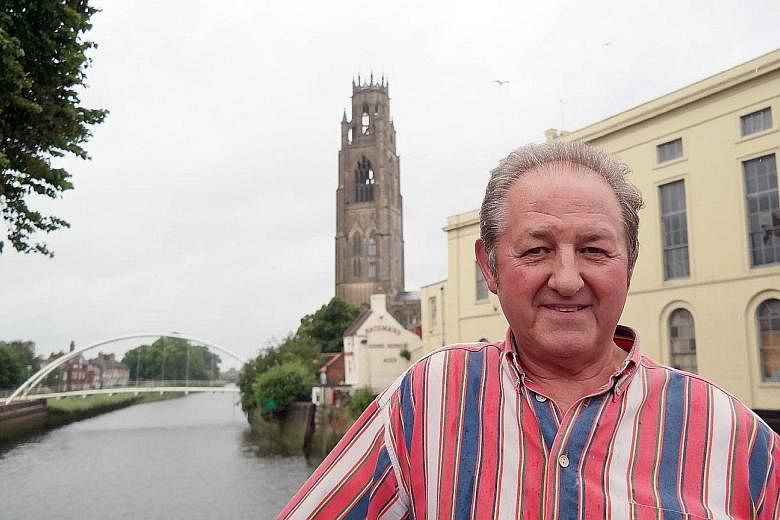At first glance, Boston in Lincolnshire looks much like any other English town. A big Asda supermarket sits just across the railway station, a line of shops and eateries leads into the town centre, and a cathedral - albeit a stunning one - rises from the heart of it.
But, on closer look, those shops on the main thoroughfare of West Street all have un-English names: Baltic Food, European Express, Europe Market.
Driving through his town, Mr Geoff Rylott, 70, shakes his head at just how much immigration, especially from Eastern Europe, has changed the landscape of the once sleepy market town in five years.
"Foreign shop, foreign shop, foreign restaurant, foreign barber, foreign shop, foreign shop," he rattles off, pointing to establishments left and right.
"They've completely taken over this town. Immigration has ruined it."
Boston is home to the largest proportion of Eastern European immigrants in England and Wales. Poles, Lithuanians, Latvians and Romanians now make up more than 10 per cent of the town's population of 65,000.
Earlier this year, it had the ignominy of being named the murder capital of England and Wales, based on police figures, trumping London.
Mr Rylott blames it all on uncontrolled immigration - the key reason he and everyone else he knows in the town voted for Britain to leave the EU on June 23.
Boston had the country's highest number of Leave voters, at 75 per cent.
"You wouldn't dare walk through this town at night after 10 o'clock. You'll either get stabbed or raped," says the retired grafter and member of the UK Independence Party.
Every Wednesday and Sunday, he sees Eastern Europeans get dropped off at the Asda supermarket carpark by the bus loads.
Most end up working in the food processing industry, either cutting crops on farms or packing vegetables for the supermarkets.
They are willing to work on the minimum wage, says Mr Rylott, at £7.20 (S$12.90) an hour, and that has depressed wages in the town.
"They work very hard. I'm not decrying them working. I'm just saying the employers, farmers and pack houses have taken advantage of the cheap labour. These are the people who pull the price down."
Their numbers have strained public services and pushed up rents.
Mr Rylott says that as many immigrants are willing to pack themselves into the same space, often up to 10 in a three-bedroom house, one of these houses can go for £600 a week, two to three times the rent five years ago.
Residents complain of noise and poorly kept houses; there is graffiti on the town walls and groups of men regularly have drunken parties at the park, causing much nuisance, says the father of three.
"Boston people keep out of their way because they've brought fear to the town."
Mr Rylott feels abandoned by his government which he thinks is not protecting livelihoods in the farming and fishing industries, subjecting them instead to unfavourable EU laws such as those that restrict trawling to within a certain area.
"The Tories have walked all over us, and the councils tell you we're governed by London. Our hands are tied. That's all you get. But people have spoken now and London has had to listen."
He does not buy into arguments that exiting the EU will be disastrous for the British economy.
"That's the fear factor. It will go down but it will come up; that's the nature of the markets."
He just hopes that change will come soon enough.
"I'd hate to think what this town would be like in 25 years' time. I just can't see where it's going."
Tan Dawn Wei


